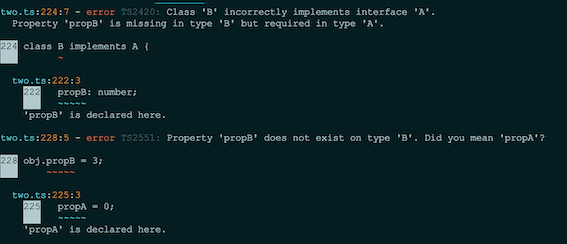What are ‘implements’ clauses in TypeScript ?
Last Updated :
09 Mar, 2022
In Typescript an implements clause can be used to verify that a class conforms to a specific interface. If a class fails to implement an interface correctly, an error will be generated. Classes can implement a single interface or multiple interfaces at once.
Example 1: An interface A is created with has a function display of type void. Class B and Class C implement interface A. Class B doesn’t raise an error as method display is properly implemented but class C has a method Display(), which is different from the method defined in the interface, so typescript compiler raises an error that class ‘C’ incorrectly implements interface ‘A’.
Javascript
interface A {
display(): void;
}
class B implements A {
display() {
console.log("B");
}
}
class C implements A {
Display() {
console.log("C");
}
}
|
Output:
error TS2420: Class 'C' incorrectly implements interface 'A'.
Property 'display' is missing in type 'C' but required in type 'A'.
class C implements A {
~
display(): void;
~~~~~~~~~~~~~~~~
'display' is declared here.
Example 2: If an additional property exists in an interface does not make that property exist in the class that implements it unless the properties are defined. In such cases typescript compiler raises errors.
Javascript
interface A {
propA: number;
propB: number;
}
class B implements A {
propA = 0;
}
const obj = new B();
obj.propB = 3;
|
Output:

Reference: https://www.typescriptlang.org/docs/handbook/2/classes.html#implements-clauses
Like Article
Suggest improvement
Share your thoughts in the comments
Please Login to comment...